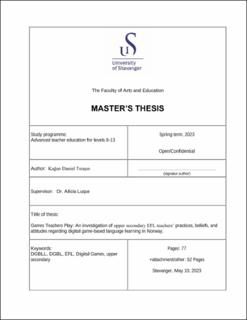| dc.description.abstract | This master's thesis examined the attitudes, beliefs and practices of upper secondary school English (EFL) teachers in Norway towards digital game-based language learning (DGBLL). Additionally, it explored the current state of digital game utilization, particularly focusing on the games and genres employed.
Digital games, which are games played using an electronic device, are combined with educational content, or learning principles through digital game-based learning (DGBL). DGBLL is a form of DGBL specifically tailored for language learning. The study that is part of this master’s thesis not only focuses on EFL teachers' use of and attitudes towards digital games but also recognizes the importance of Second Language Acquisition (SLA) theories in relation to DGBLL and teacher cognitions (i.e., what teachers know, believe, and think regarding the use of digital games in their EFL classrooms) as essential components.
Data was collected through an online, mixed-methods questionnaire. The questions targeted information about attitudes towards and use of digital games in English as a foreign language (EFL) in formal learning contexts and were designed to collect information to answer the three research questions that guided the study which focused on the use of DGBLL, the attitudes towards DGBLL and the games and game genres employed in EFL instruction in the context of Norwegian upper secondary EFL classrooms, respectively. The questionnaire was comprised of three parts across a total of five pages with a total of 48 questions.
A total of 219 upper secondary EFL teachers with diverse educational backgrounds from all parts of Norway participated in the study. Among them, women comprised the majority of respondents at 68.5%. Data analysis involved a combination of descriptive statistics and inductive content analysis, facilitating a comprehensive examination of both quantitative and qualitative data.
Findings revealed that while only about half of the teachers in this study were familiar with the term DGBLL, a large majority believed digital games could be effectively used for teaching EFL. Almost 75% reported using digital games in their EFL instruction, mostly to target vocabulary, listening, speaking, and reading skills. Comparisons with previous studies suggests an increasing trend in the utilization of digital games for EFL education. Furthermore, the results suggested that the reported use of games in instruction varied by age and gender, with younger teachers and possibly female teachers being more likely to use games in the context of EFL. Also, EFL teachers in this study expressed generally positive attitudes towards DGBLL. Specifically, a large majority of the teachers believed that digital games could be used to meet the Norwegian curriculum and core pedagogical standards, serve as useful teaching and learning tools, and play a supporting role in EFL education.
Despite the positive outlook, obstacles to DGBLL integration were also identified, including lack of time and inadequate knowledge and skills, the latter ascribed to insufficient or outdated teacher training. Additionally, a potential link between playing games for leisure and perceived competence for implementing DGBLL was also noted. However, personal gaming interest did not appear to be a deciding factor for the instructional use of DGBLL for EFL.
Finally, the study revealed that teachers employed a variety of digital games in their EFL instruction, mostly from the Serious Games and Puzzle/Quiz genres. The most popular games included Spent, Fake News, Minecraft, Quizlet and Kahoot!. More than half of the twenty most popular games used by the teachers in this study are listed either on the Norwegian Digital Learning Arena or Statsped websites, along with supporting resources. The choice of games seems to reflect the beliefs and concerns about DGBLL expressed by the EFL teachers in this study, as the games were suitable for upper secondary students and EFL, their use was economical and time-efficient, and teachers possibly benefited from the availability of supporting resources from reliable sources. Moreover, the games did not require specialized technical expertise on the part of the teacher.
In conclusion, the findings of this study contributed to the broader understanding of Norwegian EFL teachers' beliefs and practices, while also informing future teacher development in DGBLL in order to contribute to the effective implementation of Digital Games in EFL education. | |
